'It's going to take years': After cop charged in sex crimes, hundreds of other cases under scrutiny
For former Detective Roger Golubski, drug dens were his personal piggy bank, sex workers his harem, and pinning crimes on innocent people a way to exert his power over the poorest Black neighborhoods in Kansas City, Kansas, according to federal prosecutors and accusations detailed in hundreds of pages of lengthy court records.
Golubski was arrested in September on six federal civil rights charges of sexually assaulting two victims while acting under color of law.
For decades as a police detective, prosecutors say Golubski preyed on poor Black women and girls in the community, raping them and then threatening to kill or arrest their family members if they told anyone, always leaving them with the warning, “Keep your mouth shut or else,” the women said.
A second indictment unsealed last week also accuses him of protecting violent drug dealers who were sex trafficking young women and girls, and of using the victims for himself.
"Golubski primarily chose young Black girls, ranging in age from 13 to 17 years old, to submit to sex and to provide sexual services to him," according to the indictment.
Golubski has pleaded not guilty. He was released from custody and put on home confinement pending trial.
"Roger denies the allegations," his attorney, Christopher Joseph, said in a statement. "He will defend both indictments at trial."
As the former detective awaits his day in court, every case he ever worked on could soon be under scrutiny and the people he's helped put behind bars could get a chance to clear their names.
'Justice is always the right thing to do'
The county's top prosecutor has been fighting to review all of Golubski's detective work since 2017, when a Kansas City man named Lamont McIntyre was freed after serving 23 years in prison for a 1994 double murder he didn't commit.
The lead detective in the case was Golubski.
"That led me to believe there were extreme concerns with that detective and his work on that case," Wyandotte County District Attorney Mark Dupree told USA TODAY. "It was clear that this gentleman believed he could do whatever he wanted to do."
Making a case against former cop: Ex-Kansas police detective allegedly helped run underage sex-trafficking operation for girls
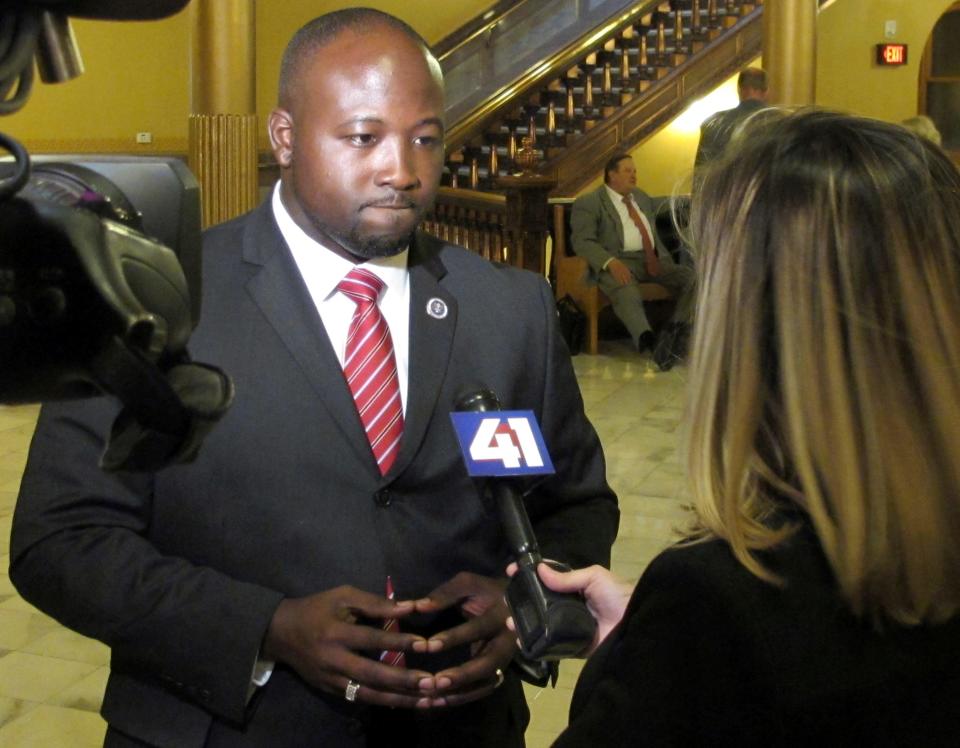
In the wake of Golubski's back-to-back indictments, the county's board of commissioners last week passed a resolution to fund the $1.7 million it will take to digitize more than 4,000 unorganized boxes that include police investigations dating back to the 1950s.
Dupree hopes the files will start being digitized on Dec. 1 and take between six months to a year and a half. After that, reviewing individual cases will take much more time.
"It's going to take years, there's no doubt about it," he said.
Although many of the people convicted stemming from investigations involving Golubski may be out of prison or deceased by now, it's vitally important to correct any possible wrongful convictions, Dupree said.
"Justice is always the right thing to do," he said. "If a system does not do what is right and what is just, we need (victims) to come forward so we can not only clear their names, but so that we can correct the system so that it cannot victimize anyone else in the future."
'Everyone knew how powerful Golubski was'
Golubski's back-to-back indictments prompted USA TODAY to conduct a review of dozens of court records filed in McIntyre's case. The court records paint a picture of corruption at its deepest, with one member of the community describing the former detective as "a dirty, crooked cop.”
An arrest that brought little relief: Claims a Kansas City cop was raping women swirled for decades.
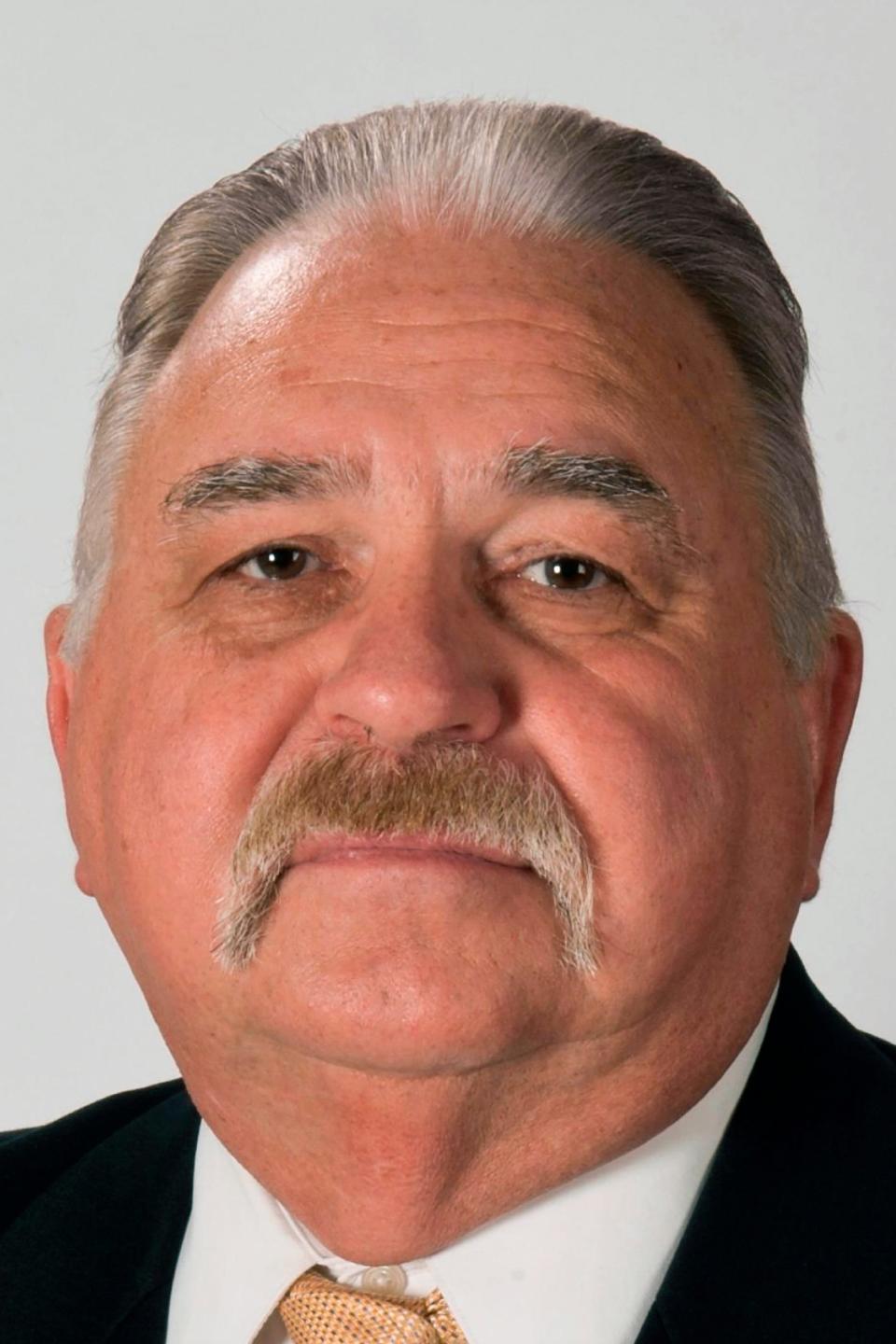
"Everyone knew how powerful Golubski was," said Kendra Dean-Martin, a cousin of McIntyre's who was involved in gang activity as a teen but has since turned her life around.
"(Golubski) protected the drug dealers but was never investigated for his illegal activities," Dean-Martin said in a 2015 affidavit. "Basically, Golubski was a member of the criminal community and he also had the power of his badge. We all knew he could do anything to anyone and people frequently said he would ‘put a case’ on those he wanted to target."
Lamonte McIntyre says that's just what Golubski did to him.
In a lawsuit filed a year after he was freed from prison, McIntyre sued Golubski, accusing the detective of framing him for a double murder when he was just 17 years old. McIntyre's mother, Rosie McIntyre, said Golubski targeted her son because she refused to agree to a long-term sexual arrangement with the detective after he raped her.
A government agency settled the lawsuit earlier this year, agreeing to pay the McIntyres $12.5 million.
In affidavits and depositions taken under penalty of perjury, at least half a dozen people said everyone in the neighborhood knew that McIntyre didn't commit the 1994 double murder of 22-year-old Doniel Quinn and 34-year-old Donald Ewing. Rather, the men were killed by the teenage henchman of a notorious area drug dealer named Aaron Robinson who is now dead, according to the community members.
"The guy who got convicted for these murders had nothing to do with it," Cecil Brooks, an admitted drug dealer who also worked for Robinson, said in a 2016 affidavit. "None of us had ever heard of him."
It was widely known in the community that Golubski was protecting Robinson and Brooks because they were paying him off "to stay out of jail and criminal trouble," Dean-Martin said.
"During this time these big dealers engaged in kidnappings, beatings and other violent acts," Dean-Martin said. "They knew they could do this because they had Golubski on their team. The perception was that they could do anything."
Another community member named Shonda Nichols said in a 2014 affidavit that "Golubski’s badge gave him leverage over people to get what he wanted."
"Detective Golubski openly cruised through the neighborhoods where crime was occurring, shaking down drug dealers and picking up female prostitutes for his own enjoyment," she said. "He was known as a corrupt officer ... He was simply part of the criminal community where drugs and sex were sold."
Golubski retired from the Kansas City, Kansas Police Department in 2010, collecting a full pension, and then worked for another nearby police agency until 2016.
What did the department know?
Community members and local police watchdog groups say that Golubski's abuses were so open and so egregious, there's no way his superiors didn't know about them.
One retired homicide detective, Timothy Maskil, said in a September 2015 deposition that Golubski wasn't even working in homicide at the time of the double murder that McIntyre was convicted of, but somehow got to be the lead investigator.
Maskil said he found that Golubski never even applied for a search warrant for McIntyre's home, standard in any homicide investigation, and that he improperly included three McIntyre family members in a five-person lineup for witnesses.
At least some corruption was known to his superiors, Maskil said.
"Throughout the police department Roger Golubski was known for having sex with Black, drug-addicted prostitutes," he said, adding that Golubski also used the women as informants. "I believe the entire department knew about this ... I believe that Roger Golubski used his color of authority over these prostitutes/informants to obtain sexual relations."
Maskil went on to say that he knew the department's administration talked to Golubski about his involvement with sex workers in the community several times but that they "turned a blind eye to Golubski’s activities because the information … seemed to get results, in terms of getting cases ‘cleared.’"
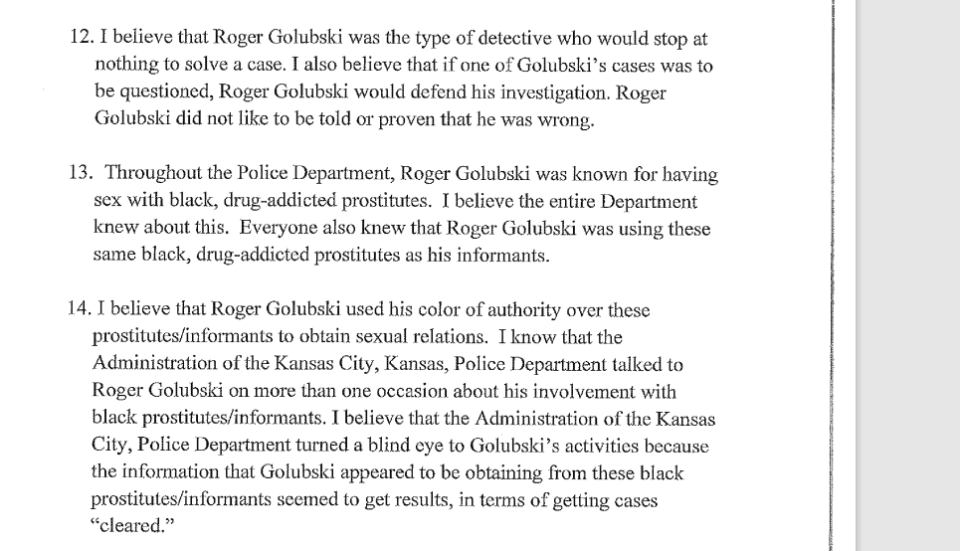
At least one woman complained about Golubski to the department's internal affairs division in 2004 and was told "there was nothing they could do because it was her word against" the detective's, prosecutors say.
Golubski's fellow officers – including one of his former partners – have said they knew nothing about any abuses that may have happened.
"There was nothing that ever indicated that Roger was doing something shady, crooked or illegal when I worked with him," said Terry Zeigler, who was Golubski's partner for about three years, worked in the department's internal affairs unit for a decade and went on to become the chief of police between 2015 and 2019.
When they were partners, Zeigler said he would do crime scene diagrams and Golubski would interview witnesses.
"My experience with seeing him interact with people in the streets was people would seek him out, call him out, yell his name out and talk to him," said Zeigler, now a private investigator. "I never heard any rumors, I never received any complaints in my time dealing with internal affairs on Roger doing any of the things that he's been alleged to have done."
Lauren Bonds, executive director of the National Police Accountability Project, isn't buying it.
"In these situations when there's a bad actor in a police department, when you get a chance to really look at it, there's quite the paper trail, and more than one person in the department has seen it," she said.
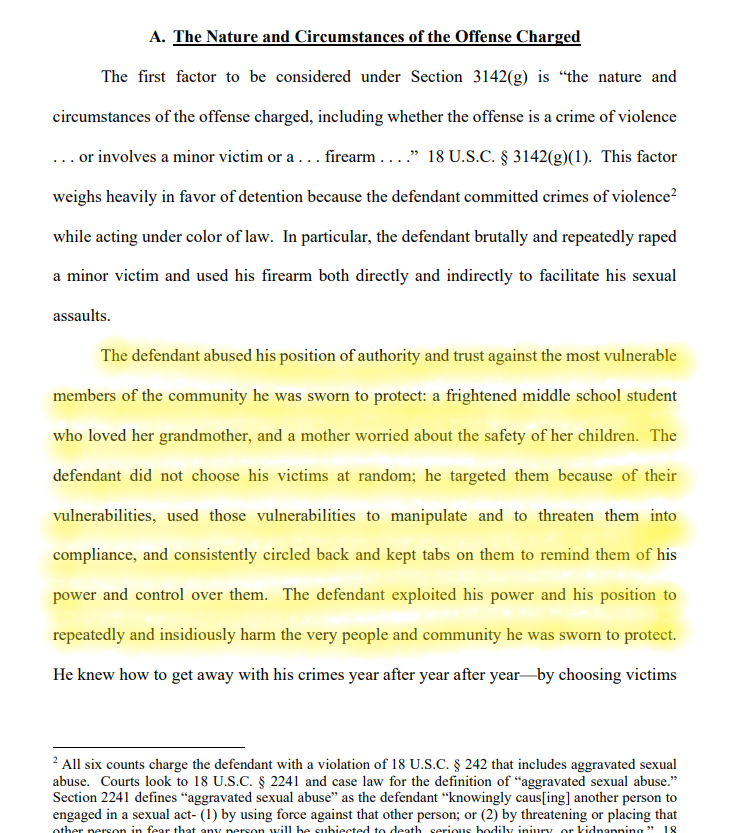
In a statement to USA TODAY, the city's current police chief did not address what the department knew and when, but said that "Roger Golubski does not represent the culture, vision or mission of the current Kansas City, Kansas Police Department."
"Roger Golubski has been charged with deplorable crimes," Chief Karl Oakman said. "Although the crimes date back 20 to 25 years ago, he did wear the uniform and caused pain to members of the community and shame to the badge. Based on these charges Golubski’s tenure in law enforcement was a moral, ethical and legal failure. KCKPD will continue to assist the FBI in their criminal investigation of Golubski’s past behavior.”
Moving forward
District attorney Dupree said he's only been able to start digging into Golubski's cases since Oakman became chief in 2021 and that cooperation with the agency before that was "minimal."
"Under Chief Oakman, they began to open that communication and be extremely cooperative with sharing the information and files concerning Roger for the last 35 years that ultimately led to his indictment," Dupree said. "I think that it's important that the community know that there has indeed been a change of leadership, a change of administration, and a change of those who control the old guard to protect the status quo, versus those who are pursuing justice at all costs."
Looking into Golubski's old cases for improper convictions is a good way to start to build the community's trust in law enforcement again, Bonds said, but added that it's going to take a very long time.
"I mean, these are the kinds of things that really undermine trust for generations," she said.
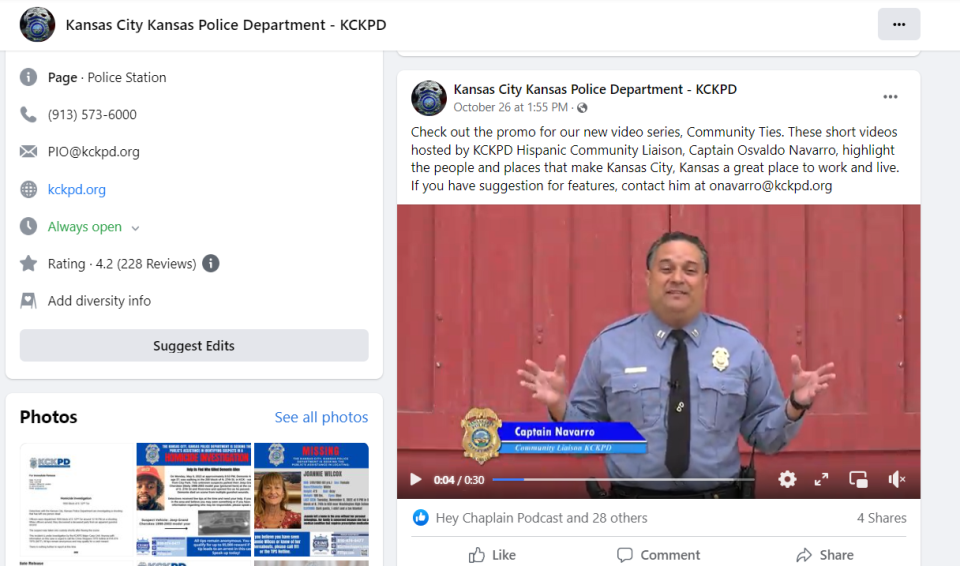
In his statement, Oakman said that his department "has made great strides to increase transparency and improve its relationship with the community."
He cited a community liaison, cold case unit, a monthly review of detectives designed to increase accountability, more extensive training, and an increase in programs that encourage community interaction with the department, among other initiatives.
Dupree said that his office's review of the department's past cases also could uncover other improper arrests or behavior by other officers.
"We will be able to search them out," he said, urging any community members who feel they were mistreated to come forward.
"Without the community coming forward, to give us the information to say, 'Hey, I was a victim of this fella, I was there when this happened. I saw certain things happen,'" he said. "Whether it is with Golubski or otherwise, whoever it was back in those days, we need them to come and speak to us to make sure that we are informed and that we are investigating the right cases, the right files and quite frankly the right name.
"If people are not willing to come forward, then justice oftentimes will continue to go without having done what it was meant to do, which is bring closure to to the right folks."
This article originally appeared on USA TODAY: Roger Golubski: Cop turned alleged criminal forces massive case review

